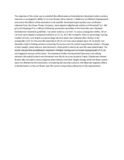Devitalisation of 'Bellerose' cut rose (Rosa hybrid L.) flowers: effects of Glyphogan® and Roundup® on propagation ability and vaselife.

View/
Date
2015Author
Hutchinson, MJ
Onyango, CM
Miranyi, HK
Kimani, E
Language
enMetadata
Show full item recordAbstract
The objective of this study was to establish the effectiveness of devitalisation treatment phyto-sanitary measure on propagation ability of cut rose flowers (Rosa hybrid L.) 'Bellerose' at different dipping levels and assess the effects of the treatment on its vaselife. Harvested export quality rose cut flowers obtained from Sian Roses Flower Company, were dipped in glyphosate solutions of Roundup® (a.i. 360 g/L) and Glyphogan® (a.i. 480 g/L) following procedures described in the Australian pre-shipment devitalisation treatment guidelines. Tap water acted as a control. To assess propagation ability, 50 cm cut roses were dipped in prepared solutions at 15, 25, 35 or 45 cm depths. Data on percentage rooting, number of roots, root length and percentage necrotic stems was collected after 26 days in the propagation unit. For the vase life experiment, 40 cm cut roses were dipped up to 35 cm depth and thereafter held in holding solution containing 2% sucrose and 1% sodium hypochlorite solution. Changes in fresh weight, water balance, leaf abscission, chlorophyll content and vase life were determined. The results showed that devitalisation treatment inhibited rooting even at lowest dipping depth of 15 cm and triggered necrosis of the stems. The treatment further increased leaf abscission and wilting, reduced chlorophyll content and shortened vase life of cut roses by about 2 days. Glyphosate-treated flowers also recorded a worse negative water balance and fresh weight change while the flower petals were not affected by the treatments. Considering bio-security concerns, the observed negative effects of devitalisation on the cut flower vase life cannot compromise adherence to the requirements.
URI
http://www.cabdirect.org/abstracts/20153189390.html?resultNumber=0&q=au%3A%22Onyango%2C+C.%22http://hdl.handle.net/11295/85134
Citation
Acta Horticulturae 2015 pp. 83-94Publisher
University of Nairobi
